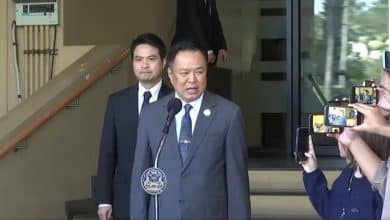World News
World news, global politics, business, technology, and culture—stay updated with breaking stories, international trends, and major events. Get the latest from The Thaiger, your trusted source for global news.
-

South Korea visa-free trial launched for Indonesian group tourists
South Korea launched a visa-free trial scheme for Indonesian tourists travelling in organised groups, as part of its broader effort to attract 30 million foreign visitors annually. The South Korean government unveiled a new campaign titled “Visit Korea Year” during the 11th National Tourism Strategy Meeting, held under the theme “K-Tourism, Embracing the World: A Great Transformation of Inbound Tourism,…
-

Blind Myanmar refugee found dead after police drop-off in New York
A blind Myanmar refugee and father of two was found dead on February 24 in Buffalo, New York, after being released from custody and later left at a Tim Hortons coffee shop, prompting calls for a full investigation in the United States. The deceased was identified as Nurul Amin Shah Alam, who had fled Myanmar and entered the United States…
-

Brazilian suspect admits killing Thai woman in Japan apartment
A Brazilian man confessed to killing a Thai woman by strangling her at his apartment in Tsu City, Mie prefecture, Japan. The Thai woman was identified as 47 year old Supaluck Narusue, who lived and worked part time at a factory in Okazaki city in Aichi prefecture. She did not return home after telling her family she would meet a…
-

Suvarnabhumi Airport apologises after complaint about rude staff and poor service
Suvarnabhumi International Airport issued an apology after Thai travel bloggers and other passengers complained about rude behaviour and poor customer service at a security screening checkpoint. Several travel bloggers posted in recent days about negative experiences at security and passenger screening points at Thai airports, particularly Suvarnabhumi. Many said officers spoke to passengers without manners and showed little service-mindedness. The…
-

Sydney hammer attack leaves South Korean man and 2 Thais injured
A South Korean man and two Thai nationals were injured in a hammer attack in Sydney, Australia, on February 18, after they were assaulted by three people while walking home from a party. The incident occurred at about 3am as the 23 year old South Korean man, identified as Dave, walked with two Thai friends aged 28 and 29. Reports…
-

Thai masseuse in Germany sued for providing ‘special service’ without consent
A Thai masseuse in Germany has to pay €1,000 in compensation to a male client after she sexually assaulted him by providing “special services” without consent. The complainant, a 26 year old German software engineer, identified only as Ben, reported the sexual assault to police two days after it occurred at a massage shop on Osloer Straße in Berlin. The…
-

Russian man jumps from plane after landing at Bangkok airport
A foreign man in underwear, believed to be a Russian national, caused chaos and jumped off an airplane from an emergency exit door shortly after it landed at Don Mueang International Airport in Bangkok, following a journey from Vietnam. A Thai woman who was travelling on the same flight shared footage of the incident on her TikTok account, @piapornchamsri, on…
-

AOT to raise passenger service charge for international flights from May
Airports of Thailand (AOT) confirmed plans to increase the passenger service charge (PSC) for international departures in May this year. While the increase will largely affect foreign travellers, AOT insisted that it will not reduce the number of international visitors to Thailand. The chief executive officer of AOT, Paweena Jariyathitipong, told local media that the PSC for passengers departing on international…
-

Cobra Gold 2026 brings over 8,000 troops to Thailand
Thailand is set to host the 45th annual Cobra Gold military exercise from February 24 to March 6, bringing together more than 8,000 personnel from 30 countries in one of the region’s largest joint defence operations. The multinational exercise, co-hosted by the Royal Thai Armed Forces and the United States Indo-Pacific Command (US PACOM), will take place across several locations…
-

Thailand considers invitation to join US-led Gaza peace board
Thailand is reviewing an invitation from US President Donald Trump to join a proposed international ‘Board of Peace’ aimed at resolving the conflict in Gaza, according to the Ministry of Foreign Affairs today, January 19. The initiative, part of Trump’s proposed Comprehensive Plan to End the Gaza Conflict, outlines the creation of a peace board initially focused on Gaza, with…
-

Thai foreign minister seeks clarity on US immigrant visa halt
Thailand’s foreign minister met with a top United States diplomat in Bangkok today, January 15, to seek clarification over Washington’s recent decision to suspend immigrant visa processing for 75 countries, including Thailand. Foreign Affairs Minister Sihasak Phuangketkeow said he had summoned the US chargé d’affaires in Thailand to discuss the move, after Thailand appeared on a newly released list of…
-

Thailand among 75 nations hit by US visa processing suspension
The United States will temporarily suspend immigrant visa processing for Thailand and 74 other countries, effective January 21, 2026, as part of tighter immigration screening under its America First policy, the US State Department announced on January 14. The immigration visa freeze targets applicants from countries where migrants are said to disproportionately rely on public assistance after settling in the…
-

Thai students claim top prize at Harbin snow sculpture contest
Thai vocational students from Bangkok and Chiang Rai won the 2026 International Collegiate Snow Sculpture Contest in Harbin, China, with a sculpture inspired by the Siamese fighting fish and goddess of water. The annual snow sculpture contest, organised by Harbin Engineering University, returned for its 18th edition this year. The competition was held from January 4 to 7 in Harbin,…
-

New ‘Republic of Kawthoolei’ announced at Thai-Myanmar border
The son of a former leader of the Karen National Union (KNU) declared independence and announced the establishment of the Republic of Kawthoolei, a self-proclaimed state located along the Thai–Myanmar border. Nerdah Mya, the son of former KNU leader Bo Mya, introduced himself as the first president of the Republic of Kawthoolei, meaning “the land without darkness” in Karen, on…
-

Cambodia accused of covering up Angkor Wat YouTuber assault
A travel YouTuber, known as The Country Collectors, who was assaulted at Cambodia’s Angkor Wat, posted a statement yesterday, January 7, that the Cambodian government has now attempted to cover up the story. In his statement posted on social media, the YouTuber said the APSARA National Authority, responsible for overseeing Angkor Archaeological Park, released an official response to the story.…
-

Missing Chinese influencer found injured and begging in Cambodia
A Chinese influencer was found injured and begging for money in Cambodia after losing contact with her family since December 26 last year. Images of a Chinese woman carrying an X-ray film circulated widely on Cambodian and Thai social media recently. The woman was seen wearing a white mini dress with a tweed blazer, glasses, and a headband worn across…
-

Thailand calls for restraint amid US-Venezuela tensions
Thailand’s Ministry of Foreign Affairs yesterday, January 4, issued a statement calling for restraint amid escalating tensions between the United States and Venezuela. The US launched a military strike across northern Venezuela on Saturday, January 3, under an operation named Operation Absolute Resolve. During the raid, Venezuelan President Nicolás Maduro and his wife, Cilia Flores, were captured following allegations that…
-

Royal Thai Navy detains 67 Cambodian migrants attempting illegal border crossing into Thailand
The Royal Thai Navy has detained 67 Cambodian migrant workers who attempted to illegally cross the Thai border in Chanthaburi province, authorities confirmed on January 3, 2026. The group included men, women, and children who officials said were fleeing severe economic hardship, unemployment, and food insecurity in their home communities. Rear Admiral Parach Rattanachaiyapan, spokesperson for the Royal Thai Navy,…
-

Explosion at Swiss Bar in Crans-Montana Kills at Least 40
Swiss Ski Resort Tragedy Explosion at Crans-Montana Bar Kills ‘Dozens,’ Italy Reports 40 Dead CRANS-MONTANA — A devastating explosion followed by a massive fire at a popular bar in the renowned Swiss ski resort of Crans-Montana has resulted in a “mass casualty” event, sending shockwaves across Europe. Swiss police confirmed “dozens” of fatalities, while Italian authorities report the death toll…
-

Body of Missing 19-Year-Old Texas Teen Found After Christmas Eve Disappearance
Tragic End: Body of Missing 19-Year-Old Texas Teen Found After Christmas Eve Disappearance SAN ANTONIO, TEXAS — The desperate search for Camila Mendoza Olmos, 19, who vanished on Christmas Eve, has concluded with a heartbreaking discovery. Bexar County Sheriff Javier Salazar confirmed on Tuesday afternoon that search teams located a lifeless body in a field near the residential area where…
-

Thai and Cambodian diplomats meet in China to reinforce ceasefire and border stability
Top diplomats from Thailand and Cambodia met in China on Sunday for high-level talks aimed at reinforcing a fragile ceasefire and preventing a return to fighting along their disputed border, as Beijing steps up its role as a regional mediator. The meetings follow the signing of a new ceasefire agreement intended to halt weeks of clashes that have killed more…
-

Trump says Thailand-Cambodia peace achieved with ‘very little assistance’ from UN
US President Donald Trump said yesterday, December 28, that Thailand and Cambodia returned to peace following a recent ceasefire agreement, claiming the outcome was achieved with “very little assistance” from the United Nations (UN). Trump made the statement on his social media platform, Truth Social, shortly after the ceasefire agreement between Thailand and Cambodia was reached on Saturday, December 27. In…
-

Thailand agrees to ceasefire, rejects pre-clash position return
Thailand says it is prepared to enter a short ceasefire with Cambodia but will not accept any deal that requires Thai forces to retreat from areas they have secured during the latest border clashes. Prime Minister Anutin Charnvirakul said the National Security Council has approved a 72-hour ceasefire proposal and authorized Defense Minister Nattaphon Narkphanit to represent Thailand at talks…
-

Cambodian men charged over attack on Thais in South Korea
Four Cambodian men were arrested today, December 26, and charged in South Korea after allegedly attacking two Thai nationals with glass bottles on the morning of December 7 in Yeongam county, South Jeolla province. The assault took place on the morning of December 7 in the Samho-eup area of Yeongam county, South Jeolla province, when a group of four Cambodian…
-

Thai tutor confronts foreign man shouting ‘Ni Hao’ and urges others to speak up
A Thai English-language tutor and social media influencer shared her experience of confronting a foreign man who shouted “Ni Hao” at her, urging others not to stay silent when faced with similar behaviour. The influencer, Warinthorn “Ann” Euawasinthon, widely known as Kru P’Ann, is the founder of Learnovate and a popular online educator. She has more than 1.7 million followers…
-

South Korean celebrity Hwang Hana returns home and surrenders to drug charges
A South Korean celebrity, Hwang Hana, who was wanted under an Interpol Red Notice, returned to her home country yesterday, December 24, and surrendered to authorities to face legal proceedings over drug-related offences. The 37 year old celebrity is widely known as the granddaughter of the founder of Namyang Dairy Products, one of South Korea’s major food companies. She is…
-

Malaysian woman allegedly lives double life after secret marriage in Songkhla
A Malaysian woman called on religious authorities to take action after discovering that her brother’s wife had secretly married another man in Songkhla province of Thailand and lived a double life for more than a year. The woman, identified as Ekin Derahim, shared details of the alleged affair on her Facebook account on December 11. In her post, she also…
-

Malaysia thanks Thailand for role in repatriation of online scam victims
Malaysia has formally thanked Thailand for its coordination and assistance in the successful repatriation of 31 Malaysian nationals who were victims of an online job scam in Myawaddy, Myanmar. According to reports by Asian News Network and The Straits Times, Malaysia’s Ministry of Foreign Affairs confirmed that all 31 victims were safely repatriated on the evening of December 20 and…
-

US trade deal on hold as tariffs could rise if border conflict drags on
A senior official at Thailand’s Ministry of Commerce has warned that any trade deal with the United States cannot be finalized until a new parliament and cabinet are in place, as concerns grow that Washington could raise tariffs if fighting between Thailand and Cambodia is not resolved. Speaking on Friday, Chotima Iamsawadikul, director-general of the Department of International Trade Negotiations,…
Broke? Find employment in Southeast Asia with JobCute Thailand and SmartJob Indonesia. Rich? Invest in real estate across Asia with FazWaz Property Group or get out on a yacht anywhere with Boatcrowd. Even book medical procedures worldwide with MyMediTravel, all powered by DB Ventures.





























